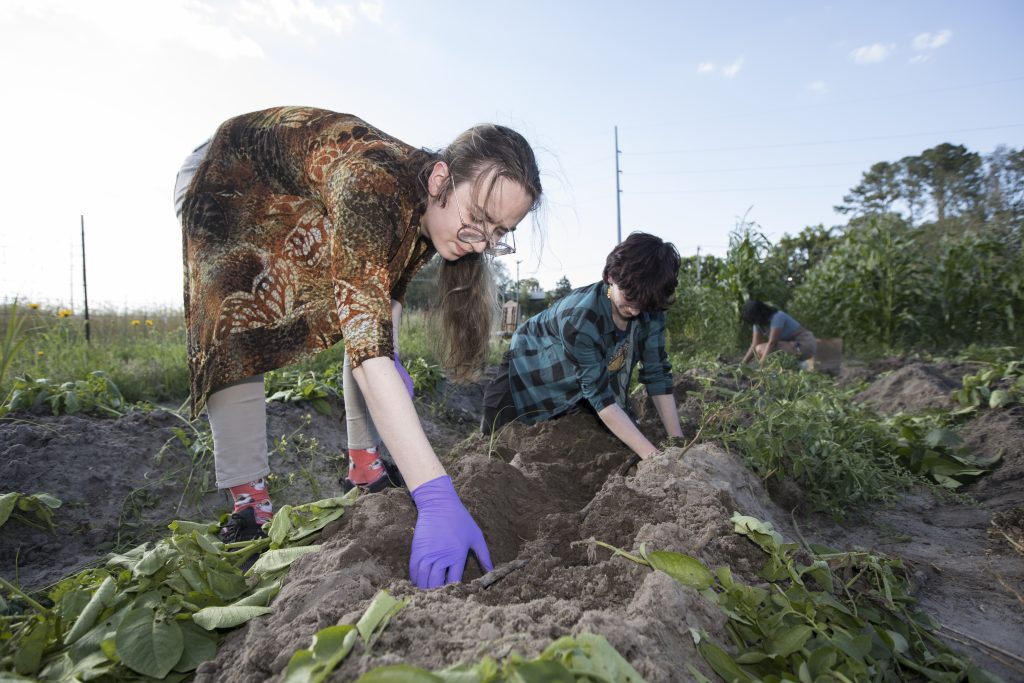Therapeutic horticulture may offer noticeable benefits to patients with chronic lower back pain, according to a recent study from the University of Florida Institute of Food and Agricultural Sciences (UF/IFAS) and the UF College of Medicine.
The interdisciplinary study encouraged chronic lower back pain sufferers to participate in a one-hour therapeutic horticulture session at the Wilmot Botanical Gardens at UF/IFAS, during which trained therapists helped the participants reach, stretch and bend to gather plant clippings. Researchers noted a pronounced improvement in the participants’ well-being after the session. Most substantially, the experience reduced the amount of anxiety that participants felt about movement and exercise as it related to their lower back pain.
“It’s important because gardening is a way to get someone with low back pain moving and interacting and not isolating themselves for fear of pain, in a safe way,” said Leah Diehl, the director of therapeutic horticulture at Wilmot Botanical Gardens and a study author. “Also, could prescribed gardening activities be an alternative to needing to take pain medication for some patients? This preliminary study encourages us to explore that possibility.”

The two-part study, funded by the UF Health Sports Performance Center and published in Alternative Therapies in Health and Medicine, consisted of a survey of 170 patients and a pilot experimental group of nine patients. Most of the people surveyed expressed an interest in therapeutic horticulture and believed it could improve their mood and muscle strength, as well as lower their stress levels, increase their movement and enable them to perform self-care activities with less pain.
The results of the study were promising, Diehl said. In the pilot session, 44% of patients reported using pain medication to manage their lower back pain, and 66% believed that gardening could provide pain relief. After the horticulture session, many participants experienced improvements in anxiety, spine bending and spine rotation to the left. All participants believed that gardening improved their overall health and spine motion while reducing their lower back pain.
Considering chronic lower back pain is a common disability, impacting patients’ physical and mental well-being, UF researchers hope that more medical professionals will see the benefits of therapeutic horticulture. About 7.5% of people worldwide suffer from lower back pain – about 577 million people – and it is the leading cause of disability globally, according to the International Association for the Study of Pain.
Heather Vincent, Ph.D., vice chair of research for UF College of Medicine’s Department of Physical Medicine & Rehabilitation and the study’s principal investigator, said gardening can be a non-threatening way for people who are afraid of pain to stretch and move more.
“When you do different functional and engaging activities that you don’t think are therapeutic but actually are, you can sneak movement in in a way that doesn’t make people fearful,” Vincent said. “As an exercise person, I try hard to find creative ways to keep people who are in pain from just sitting around. If someone in pain stays sedentary, the pain gets worse.”
Vincent said the forward and side-to-side bending, twisting and rotating activities of gardening – when done properly – are perfect therapeutic lower back exercises.
“In physical medicine and rehabilitation, we use any type of approaches that are going to help our patients move more and gain more independence. We’re always on the lookout for who might have the expertise to help people keep moving,” Vincent said. “When we saw what was happening at Wilmot Botanical Gardens, we thought this would be the perfect way to go.”
###
ABOUT UF/IFAS
The mission of the University of Florida Institute of Food and Agricultural Sciences (UF/IFAS) is to develop knowledge relevant to agricultural, human and natural resources and to make that knowledge available to sustain and enhance the quality of human life. With more than a dozen research facilities, 67 county Extension offices, and award-winning students and faculty in the UF College of Agricultural and Life Sciences, UF/IFAS brings science-based solutions to the state’s agricultural and natural resources industries, and all Florida residents.
 2
2
